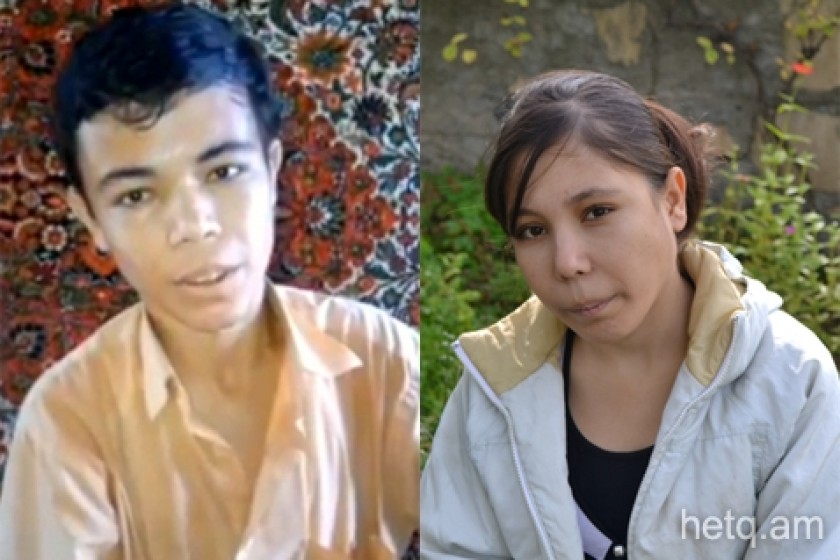
Hemolytic Anemia Strikes Ptghavan Siblings; Family Can’t Afford Proper Treatment, Says Desperate Mom
Karineh and Armen Kamboulyan, from the Ptghavan village of Armenia’s Tavoush Province, have been diagnosed with hemolytic anemia.
Their younger brother died from the ailment in 2003.
While physicians at Yerevan’s Yolyan Haematology Center, where the sister and brother have been treated, have advised them to receive monthly checkups, the family’s financial situation is such that the siblings can only see a doctor every few months.
22 year-old Armen and 20 year-old Karineh have been taking various medications for the past fourteen years. The disease has left them unable to perform any type of physical work. The two need blood transfusions on a periodic basis.
“They told me to bring the children every three months for an examination. But I can’t. We have nowhere to stay in Yerevan,” says the mother Rita Yeritsyan. “It costs us 40,000 for the round trip. I have to take them more frequently but that’s not possible.”
When the children get chest pains, they need the drug Desferal. But it is hard to come by in Armenia. Mrs. Yeritsyan gets it from parents of kids suffering the same ailment. There’s a kind of support network she says.
“They say the drug is brought her from Iran and Turkey. What I don’t understand is why we can’t the drug here when there are people suffering. Maybe the medicine is inexpensive, but I pay 20,000 AMD just for one injection.”
The government pays the family 15,000 as a medical allowance every month for each of the two children. But it hardly covers the costs of the drugs Armen and Karineh need.
Doctors at the blood center have warned the family that the children must be rushed to the hospital if their red blood cell levels fall below 40%. Their levels, at times, have fallen to 25%. “I took them that time when they got real sick. But they yelled at me, accusing me of not being a good mom. But what can I do?” asks Mrs. Yeritsyan.
“I took them that time when they got real sick. But they yelled at me, accusing me of not being a good mom. But what can I do?” asks Mrs. Yeritsyan.
Armen says he tries to help out working in the family garden but that he can’t take the risk of overdoing it because his health suffers as a result. The family grows sunflowers and grapes.
“This year, the crop burnt due to the scorching sun. We were quoted a price of 15,000 AMD for one hour’s of water,” Armen says.
The young man says he wants to build a hothouse on the family plot and has asked other village residents about the ins and outs of the business. Armen remains hopeful that his dream of owning a business will succeed one day.
Sacks full of sunflower seeds, ready for sale, are lined up in the house. The income merely allows the family to obtain the daily basics and pay off a portion of their debts. The family never sold their grapes this year and the fruit will be crushed to make wine.
Mrs. Yeritsyan confesses that village shops will not advance her any more credit.
“I worked in the summer. It’s not like I was sitting around the house,” she says. “But I can’t work as much as I used to.”
The family relocated to Ptghavan in 1988 as refuges from the village of Vardashen in Azerbaijan. In 2002, they were issued a new house built for the Armenian refugees by the government.
Karineh graduated from the Noyemberyan State College this year with a degree in accounting. Right now, she dreams of getting any type of work.
“There’s the mayor’s office here and a school. The jobs in the village stores are passed down from mother to daughter, father to son,” she says.
Rita’s husband Aleksander suffers from a spinal tear and walks with a great deal of pain. Rita needs a gall bladder operation.
Rita and Armen tell me that reporters have visited them on many occasions; even from overseas. Many promised to help but the family has yet to receive any tangible assistance.
“The reporters come and go. They give the kids hope and they get encouraged. I’ve already come to grips with my life. But my children are still hopeful,” Rita says. “There is treatment for their disease, but there is no money. They have to get treated overseas.”
 Videos
Videos Photos
Photos
Comments (1)
Write a comment